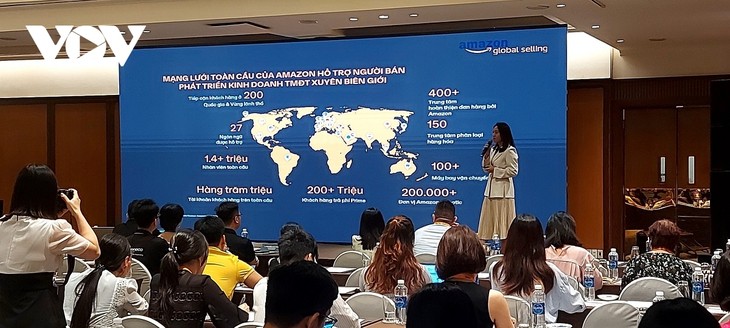(VOVWORLD) - Cross-border e-commerce has opened a huge digital market with opportunities for Vietnamese businesses to increase their trade. Besides developing a digital infrastructure, Vietnamese businesses have invested in improving product quality and packages to trade on international e-platforms.
 The total number of Vietnamese goods sold on cross-border e-commerce platforms in 2022 increases 40% compared to 2021. (Photo: VOV) The total number of Vietnamese goods sold on cross-border e-commerce platforms in 2022 increases 40% compared to 2021. (Photo: VOV) |
Last year, Vietnam’s online retail sales earned 16.4 billion USD. The digital economy earned 23 billion USD last year and the figure is expected to reach 49 billion USD by 2025.
This result is attributed to the cooperation between Vietnamese agencies and cross-border e-commerce platforms including Amazon and Alibaba to organize training courses for Vietnamese micro, small, and medium-sized enterprises on ways to market and export goods, particularly handicrafts, wood, and textiles. They have updated information concerning criteria for selecting products, standards, transportation, and cross border logistics and opening stores on Amazon.
Nguyen Tien Dat, CEO of Alan Capital, said: “Alan Capital produces agro-forestry products. On Amazon we sell our products directly to customers instead of through traders. Amazon is a prestigious platform with high criteria for ensuring product quantity. Another challenge is language. Now it’s easier to access information but businesses still need support from functional agencies.”
Do Hong Hanh, strategic partner director of Amazon Global Selling – Vietnam, said: “Selling on Amazon, businesses can access hundreds of millions of customers in 200 countries and territories. Over 2 million customers have paid for membership to enjoy advanced service, including transportation.”
Nguyen Van Thanh, Director of the E-Commerce Development Center of the Department of E-commerce and Digital Economy of the Ministry of Industry and Trade said that e-commerce is the main pillar of Vietnam’s digital economy, and is reflected in its online retail sales.
“The government and sectors have issued incentive policies to help businesses enter the e-commerce market. The Prime Minister has promulgated resolutions on developing and raising export revenue from e-commerce,” said Thanh.
To promote the potential of ecommerce in line with the Government’s policy on digital economy development, the Department of E-commerce and Digital Economy has diversified its support programs to promote digital transformation, complete policies for online export, and identify barriers while offering solutions to address them.